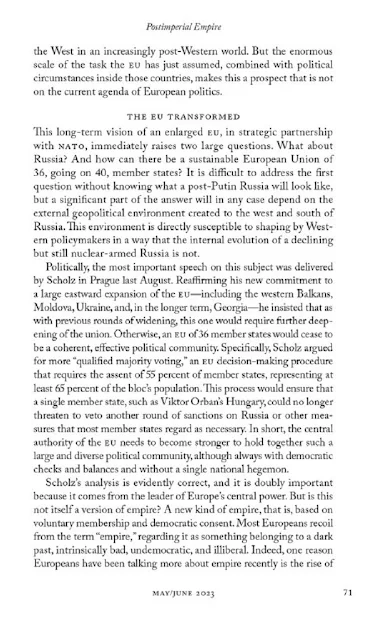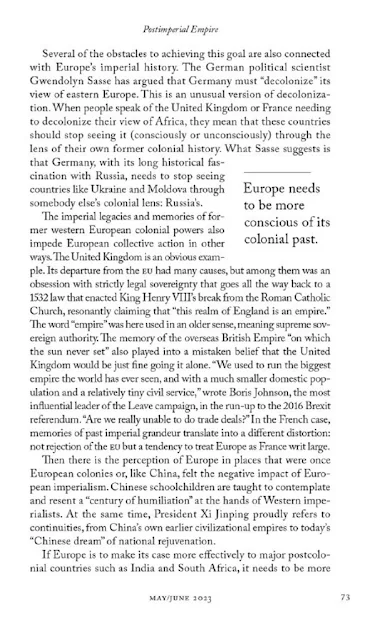Quem nunca perdeu tempo com Leszlek Kolakowski, filósofo polaco, desconhecerá a «Lei da Cornucópia infinita» - assim foi 'baptizada' por ele. Ou saberá, porque lendo John Le Carré e crendo no background intelectual do autor, a dado passo, deparou-se com uma referência à dita. E o que tem isso a ver com o texto aqui editado? Tem porque 'defendeu' ele que 'há um
número infinito de explicações para qualquer acontecimento, ilimitado, independentemente do tipo e/ou das circunstâncias.', ou seja, aconteça o que acontecer será explicado. E 'a cornucópia' até serve para explicar e justificar a normalidade anormal!
À parte a verosimilhança 'da cornucópia' o certo é que há uma anedota russa que calça como luva no texto ínsito - «Sabemos que se pode transformar um aquário numa sopa de peixe. Mas a questão é: consegue-se transformar, de novo, a sopa de peixe num aquário?»
History loves unintended
consequences.The latest example is particularly ironic: Russian President
Vladimir Putin’s attempt to restore the Russian empire by recolonizing Ukraine
has opened the door to a postimperial Europe. A Europe, that is, that no longer
has any empires dominated by a single people or nation, either on land or
across the seas—a situation the continent has never seen before.
Paradoxically, however, to secure
this postimperial future and stand up to Russian aggression, the EU must itself
take on some of the characteristics of an empire. It must have a sufficient
degree of unity, central authority, and effective decision-making to defend the
shared interests and values of Europeans. If every single member state has a
veto over vital decisions, the union will falter, internally and externally.
Europeans are unaccustomed to
looking at themselves through the lens of empire, but doing so can offer an
illuminating and disturbing perspective. In fact, the EU itself has a colonial
past. As the Swedish scholars Peo Hansen and Stefan Jonsson have documented, in
the 1950s the original architects of what would eventually become the EU
regarded member states’ African colonies as an integral part of the European
project. Even as European countries prosecuted often brutal wars to defend
their colonies, officials spoke glowingly of “Eurafrica,” treating the overseas
possessions of countries such as France as belonging to the new European
Economic Community. Portugal fought to retain control of Angola and Mozambique
into the early 1970s.
The lens of empire is even more
revealing when one peers through it at the large part of Europe that, during
the Cold War, was behind the Iron Curtain under Soviet or Yugoslav communist
rule. The Soviet Union was a continuation of the Russian empire, even though
many of its leaders were not ethnic Russians. During and after World War II, it
incorporated countries and territories (including the Baltic states and western
Ukraine) that had not been part of the Soviet Union before 1939. At the same
time, it extended its effective empire to the very center of Europe, including
much of what had historically been known as central Germany, restyled as East
Germany.
There was, in other words, an
inner and an outer Russian empire. The key to understanding both Eastern Europe
and the Soviet Union in the 1980s was to recognize that this was indeed an
empire—and an empire in decay. Decolonization of the outer empire followed in
uniquely swift and peaceful fashion in 1989 and 1990, but then, even more
remarkably, came the disintegration of the inner empire in 1991. This was
prompted, as is often the case, by disorder in the imperial center. More
unusually, the final blow was delivered by the core imperial nation: Russia.
Today, however, Russia is straining to regain control over some of the lands it
gave up, thrusting toward the new eastern borders of the West.
GHOSTS OF EMPIRES PAST













